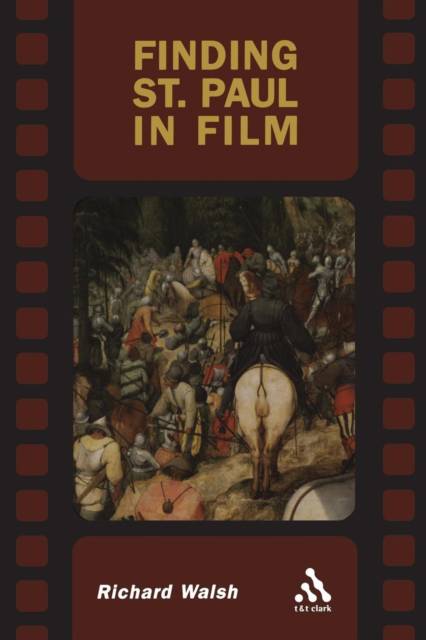
Bedankt voor het vertrouwen het afgelopen jaar! Om jou te bedanken bieden we GRATIS verzending (in België) aan op alles gedurende de hele maand januari.
- Afhalen na 1 uur in een winkel met voorraad
- In januari gratis thuislevering in België
- Ruim aanbod met 7 miljoen producten
Bedankt voor het vertrouwen het afgelopen jaar! Om jou te bedanken bieden we GRATIS verzending (in België) aan op alles gedurende de hele maand januari.
- Afhalen na 1 uur in een winkel met voorraad
- In januari gratis thuislevering in België
- Ruim aanbod met 7 miljoen producten
Zoeken
Omschrijving
Unlike Jesus, Paul has not appeared often in the movies, either as a leading man or as a
part of the supporting cast. In fact, Walsh's search of "Saint Paul" at the Internet
Movie Database (IMDb.com) found only two movies. Ingenious and enterprising scholars, like Robert
Jewett, Larry Kreitzer, and Roland Boer have brought Paul to the movies, however, by discovering Pauline
images, motifs, and texts in various "secular" films.
In Finding Saint Paul in the Movies, Walsh find a Paul who is a stranger to our questions and ideologies. As Paul does not appear often in film, the films that the book brings into dialogue with Paul have only metaphorical connections with the Paul of Christian and academic discourse. The films relate to Paul only as Walsh's interpretations of the films and of Paul render Paul the films' precursor.
Walsh's book works more abstractly. It has four major topics distributed in an equal number of chapters: (1) Paul's concept of grace (the inclusion of the Gentiles); (2) Paul's apocalyptic visions and worldview; (3) Paul's struggles with theodicy and community formation; and (4) Paul's "apostolic" or "canonical" status.
He examines movies such as Tender Mercies, Star Trek II: The Wrath of Khan, Places in the Heart, Donnie Darko, Witness, The Truman Show, Strange Days, Being John Malkovich, Fargo, Crimes and Misdemeanors, and The Apostle.
part of the supporting cast. In fact, Walsh's search of "Saint Paul" at the Internet
Movie Database (IMDb.com) found only two movies. Ingenious and enterprising scholars, like Robert
Jewett, Larry Kreitzer, and Roland Boer have brought Paul to the movies, however, by discovering Pauline
images, motifs, and texts in various "secular" films.
In Finding Saint Paul in the Movies, Walsh find a Paul who is a stranger to our questions and ideologies. As Paul does not appear often in film, the films that the book brings into dialogue with Paul have only metaphorical connections with the Paul of Christian and academic discourse. The films relate to Paul only as Walsh's interpretations of the films and of Paul render Paul the films' precursor.
Walsh's book works more abstractly. It has four major topics distributed in an equal number of chapters: (1) Paul's concept of grace (the inclusion of the Gentiles); (2) Paul's apocalyptic visions and worldview; (3) Paul's struggles with theodicy and community formation; and (4) Paul's "apostolic" or "canonical" status.
He examines movies such as Tender Mercies, Star Trek II: The Wrath of Khan, Places in the Heart, Donnie Darko, Witness, The Truman Show, Strange Days, Being John Malkovich, Fargo, Crimes and Misdemeanors, and The Apostle.
Specificaties
Betrokkenen
- Auteur(s):
- Uitgeverij:
Inhoud
- Aantal bladzijden:
- 224
- Taal:
- Engels
Eigenschappen
- Productcode (EAN):
- 9780567028501
- Verschijningsdatum:
- 7/11/2005
- Uitvoering:
- Paperback
- Formaat:
- Trade paperback (VS)
- Afmetingen:
- 154 mm x 228 mm
- Gewicht:
- 367 g

Alleen bij Standaard Boekhandel
+ 186 punten op je klantenkaart van Standaard Boekhandel
Beoordelingen
We publiceren alleen reviews die voldoen aan de voorwaarden voor reviews. Bekijk onze voorwaarden voor reviews.









